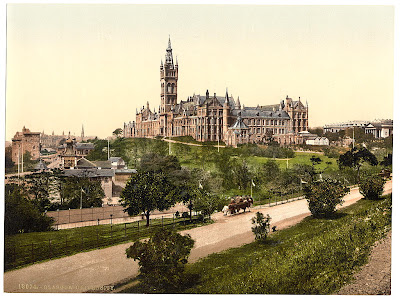 |
| William Alexander Smith |
William Smith came to Glasgow 1869 when he was just fifteen to work in his uncle’s soft goods wholesale business. His young heart must have yearned for more adventure than selling shawls, but he could not shirk duty. So he compromised. He stayed with Alex. Fraser & Co. and joined the local Rifle Volunteers, rising to the rank of lieutenant by the time he was 19.
That same year he joined the Church of Scotland. Eventually he became a Sabbath School (Sunday School) teacher. They gave him the older boys, hoping he could manage the scamps. It slowly dawned on Smith that the boys were unruly because they were bored silly. They didn’t want to sing hymns. They wanted action!
Sabbath School was suppose to teach the boys Christian values. Surely there had to be another way, a manner that could keep their attention and even be fun. He remembered how the Rifle Volunteers had filled that need for action for him. Perhaps he could combine the two activities.
So on 4 October 1883, Smith invited fifty boys to the Free Church Mission Hall on North Woodside Road here in Glasgow to form the Boys Brigade. The objective was to be: “The advancement of Christ's kingdom among Boys and the promotion of habits of Reverence, Discipline, Self-respect and all that tends towards a true Christian manliness.” They would use semi-military discipline and order, drilling with dummy rifles, dressing in military style uniforms. There would be Christian services and lessons but also sports and games.
 |
| The First Boys Brigade with William Smith (center) |
Smith always acted like the best of commanders, putting his “men” first. “Put the Boy first” was his motto. No officer was to expect the boys to do anything he wasn’t willing to do, too. The adult leaders had to sleep in tents and eat in the mess hall. No sneaking off from camp to go to a hotel.
Smith had to break that rule once in 1909, when he left camp for a couple of days. You see, he had to go down to London to be knighted for his work with children. But he came back as soon as he could. Needless to say, the boys forgave him.
Smith quit his business last year (1887) to devote himself full time to the Boys Brigade. He has been writing a rule book, editing a newsletter and taking care of paperwork. He keeps tabs on all the branches, giving advice, encouragement and occasional correction. Already there are other Boys Brigades around Great Britain. In a little over a decade there will be over 2000 companies attached to various churches throughout the British Empire and the United States.
I asked Smith about copycat organizations popping up. He said he gave his officers strict orders not to try to convert the boys to their own form of religion, however some Catholics and Jews felt the Boys Brigade too Presbyterian. If others wanted to create organizations like his to teach boys virtues, he saw no real problem. He didn’t see these clubs as competitors but allies.
In 1914, William Smith’s funeral will not only be attended by 7,000 acting and former Boys Brigade members, but by representatives of The Church Lads' Brigade, The London Diocesan Church Lads' Brigade, The Catholic Boys' Brigade, The Jewish Lads' Brigade, The Boys' Life Brigade, and The Boy Scouts. All of them acknowledged William Smith as the founder of the movement.
 |
| Sir William Smith's funeral |
 |
| Sir William D. Boyce |
A few years later William D. Boyce, a Chicago publisher, got lost in a London fog,. A lad helped him find his way back to his hotel and refused a tip. He told Boyce it was his duty as a Boy Scout to help those in need. Boyce went in search of their leader hoping for a good story, but instead got a mission from Baden-Powell and started the Boy Scouts of America.
In 1909 Baden-Powell discovered girls at a scout rally. He talked his sister, Agnes Baden-Powell, into starting the Girl Guides. He also encouraged his friend, Juliette Gordon Low, to return to America and start the Girl Scouts.
Just about every youth organization was either inspired by William Smith, or inspired by an organization he inspired. Sir William Smith is the granddaddy of them all whether they know it or not. The Boy’s Brigade was the first and it started here in Glasgow.
I think the generations of boys and girls whose lives he will inspire would mean more to William Smith than fame anyway.



















